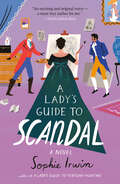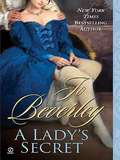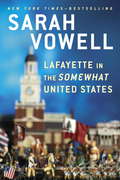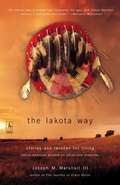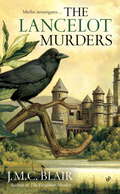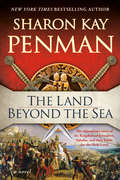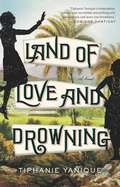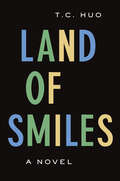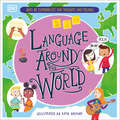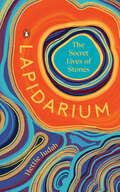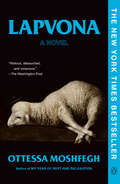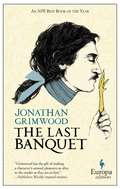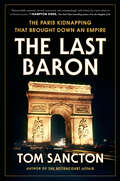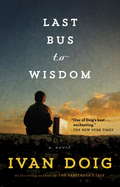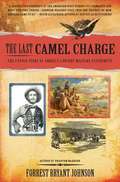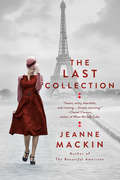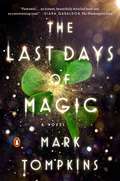- Table View
- List View
A Lady's Guide to Scandal: A Novel
by Sophie IrwinFrom the internationally bestselling author of A Lady's Guide to Fortune-Hunting, another fresh, witty take on a romantic escape led by a deeply lovable heroine determined to start living on her own termsWhen shy Miss Eliza Balfour married the austere Earl of Somerset, twenty years her senior, it was the match of the season—no matter that he was not the husband Eliza would have chosen. But ten years later, Eliza is widowed. And at eight and twenty years, she is suddenly left titled, rich, and, for the first time in her life, utterly in control of her own future. Instead of living out her mourning quietly, Eliza heads to Bath with her cousin Margaret. After years of behaving according to everyone else&’s rules, Eliza has resolved, at last, to do as she wants. But when word of the Dowager Lady Somerset&’s behaviour reach the new Lord Somerset—whom Eliza knew, once, as a younger woman—Eliza is forced to confront the fact that freedom comes with consequences. But it also brings unexpected opportunities . . .
A Lady's Secret
by Jo BeverleyWhen Robin Fitzvitry, the fun-loving Earl of Huntersdown, encounters a cursing nun in a French inn, he can't resist the mystery. He offers to help Sister Immaculata reach England, expecting amusement on the tedious journey home from Versailles. Petre d'Avernio is not exactly a nun, though she has spent years in an Italian convent with her mother, whose death has left her in danger. She must find the only person who might protect her-her true father, an English lord who does not know she exists. The gorgeous earl Robin Fitzvitry will be a dangerous ally, but she's glimpsed her pursuers and must race to the coast. She will resist him, use him, and eventually escape him with her virtue and secrets intact-she hopes.
Lafayette in the Somewhat United States
by Sarah VowellFrom the bestselling author of Assassination Vacation and The Partly Cloudy Patriot, an insightful and unconventional account of George Washington's trusted officer and friend, that swashbuckling teenage French aristocrat the Marquis de Lafayette. Chronicling General Lafayette's years in Washington's army, Vowell reflects on the ideals of the American Revolution versus the reality of the Revolutionary War. Riding shotgun with Lafayette, Vowell swerves from the high-minded debates of Independence Hall to the frozen wasteland of Valley Forge, from bloody battlefields to the Palace of Versailles, bumping into John Adams, Thomas Jefferson, Lord Cornwallis, Benjamin Franklin, Marie Antoinette and various kings, Quakers and redcoats along the way. Drawn to the patriots' war out of a lust for glory, Enlightenment ideas and the traditional French hatred for the British, young Lafayette crossed the Atlantic expecting to join forces with an undivided people, encountering instead fault lines between the Continental Congress and the Continental Army, rebel and loyalist inhabitants, and a conspiracy to fire George Washington, the one man holding together the rickety, seemingly doomed patriot cause. While Vowell's yarn is full of the bickering and infighting that marks the American past--and present--her telling of the Revolution is just as much a story of friendship: between Washington and Lafayette, between the Americans and their French allies and, most of all between Lafayette and the American people. Coinciding with one of the most contentious presidential elections in American history, Vowell lingers over the elderly Lafayette's sentimental return tour of America in 1824, when three fourths of the population of New York City turned out to welcome him ashore. As a Frenchman and the last surviving general of the Continental Army, Lafayette belonged to neither North nor South, to no political party or faction. He was a walking, talking reminder of the sacrifices and bravery of the revolutionary generation and what the founders hoped this country could be. His return was not just a reunion with his beloved Americans it was a reunion for Americans with their own astonishing, singular past. Vowell's narrative look at our somewhat united states is humorous, irreverent and wholly original.From the Hardcover edition.
The Lagoon
by Armand Marie LeroiA brilliant study of Aristotle as biologist The philosophical classics of Aristotle loom large over the history of Western thought, but the subject he most loved was biology. He wrote vast volumes about animals. He described them, classified them, told us where and how they live and how they develop in the womb or in the egg. He founded a science. It can even be said that he founded science itself. In The Lagoon, acclaimed biologist Armand Marie Leroi recovers Aristotle's science. He revisits Aristotle's writings and the places where he worked. He goes to the eastern Aegean island of Lesbos to see the creatures that Aristotle saw, where he saw them. He explores Aristotle's observations, his deep ideas, his inspired guesses--and the things he got wildly wrong. He shows how Aristotle's science is deeply intertwined with his philosophical system and reveals that he was not only the first biologist, but also one of the greatest. The Lagoon is both a travelogue and a study of the origins of science. And it shows how a philosopher who lived almost two millennia ago still has so much to teach us today.From the Hardcover edition.
The Lagoon
by Armand Marie LeroiA brilliant study of Aristotle as biologist The philosophical classics of Aristotle loom large over the history of Western thought, but the subject he most loved was biology. He wrote vast volumes about animals. He described them, classified them, told us where and how they live and how they develop in the womb or in the egg. He founded a science. It can even be said that he founded science itself. In The Lagoon, acclaimed biologist Armand Marie Leroi recovers Aristotle's science. He revisits Aristotle's writings and the places where he worked. He goes to the eastern Aegean island of Lesbos to see the creatures that Aristotle saw, where he saw them. He explores Aristotle's observations, his deep ideas, his inspired guesses--and the things he got wildly wrong. He shows how Aristotle's science is deeply intertwined with his philosophical system and reveals that he was not only the first biologist, but also one of the greatest. The Lagoon is both a travelogue and a study of the origins of science. And it shows how a philosopher who lived almost two millennia ago still has so much to teach us today.From the Hardcover edition.
The Lagoon
by Armand Marie LeroiA brilliant study of Aristotle as biologist The philosophical classics of Aristotle loom large over the history of Western thought, but the subject he most loved was biology. He wrote vast volumes about animals. He described them, classified them, told us where and how they live and how they develop in the womb or in the egg. He founded a science. It can even be said that he founded science itself. In The Lagoon, acclaimed biologist Armand Marie Leroi recovers Aristotle's science. He revisits Aristotle's writings and the places where he worked. He goes to the eastern Aegean island of Lesbos to see the creatures that Aristotle saw, where he saw them. He explores Aristotle's observations, his deep ideas, his inspired guesses--and the things he got wildly wrong. He shows how Aristotle's science is deeply intertwined with his philosophical system and reveals that he was not only the first biologist, but also one of the greatest. The Lagoon is both a travelogue and a study of the origins of science. And it shows how a philosopher who lived almost two millennia ago still has so much to teach us today.
The Lakota Way: Stories and Lessons for Living
by Joseph M. MarshallJoseph M. Marshall’s thoughtful, illuminating account of how the spiritual beliefs of the Lakota people can help us all lead more meaningful, ethical lives.Rich with storytelling, history, and folklore, The Lakota Way expresses the heart of Native American philosophy and reveals the path to a fulfilling and meaningful life. Joseph Marshall is a member of the Sicunga Lakota Sioux and has dedicated his entire life to the wisdom he learned from his elders. Here he focuses on the twelve core qualities that are crucial to the Lakota way of life--bravery, fortitude, generosity, wisdom, respect, honor, perseverance, love, humility, sacrifice, truth, and compassion. Whether teaching a lesson on respect imparted by the mythical Deer Woman or the humility embodied by the legendary Lakota leader Crazy Horse, The Lakota Way offers a fresh outlook on spirituality and ethical living.
The Lakota Way: Stories and Lessons for Living
by Joseph M. MarshallJoseph M. Marshall's thoughtful, illuminating account of how the spiritual beliefs of the Lakota people can help us all lead more meaningful, ethical lives. Rich with storytelling, history, and folklore, The Lakota Way expresses the heart of Native American philosophy and reveals the path to a fulfilling and meaningful life. Joseph Marshall is a member of the Sicunga Lakota Sioux and has dedicated his entire life to the wisdom he learned from his elders. Here he focuses on the twelve core qualities that are crucial to the Lakota way of life--bravery, fortitude, generosity, wisdom, respect, honor, perseverance, love, humility, sacrifice, truth, and compassion. Whether teaching a lesson on respect imparted by the mythical Deer Woman or the humility embodied by the legendary Lakota leader Crazy Horse, The Lakota Way offers a fresh outlook on spirituality and ethical living.
The Lakotas and the Black Hills
by Jeffrey OstlerA concise and engrossing account of the Lakota and the battle to regain their homeland. The Lakota Indians made their home in the majestic Black Hills mountain range during the last millennium, drawing on the hills' endless bounty for physical and spiritual sustenance. Yet the arrival of white settlers brought the Lakotas into inexorable conflict with the changing world, at a time when their tribe would produce some of the most famous Native Americans in history, including Red Cloud, Sitting Bull, and Crazy Horse. Jeffrey Ostler's powerful history of the Lakotas' struggle captures the heart of a people whose deep relationship with their homeland would compel them to fight for it against overwhelming odds, on battlefields as varied as the Little Bighorn and the chambers of U. S. Supreme Court. .
The Lancelot Murders (Merlin Investigation Series #2)
by J.M.C. BlairWhen Lancelot is accused of murdering Queen Guenevere’s father, she begs Merlin to prove his innocence. Though inclined to leave the faithless knight to his fate, Merlin risks his very life to find the truth at King Arthur’s bidding.
The Land Beyond the Sea
by Sharon Kay PenmanFrom the critically acclaimed New York Times bestselling author Sharon Kay Penman comes the story of the reign of King Baldwin IV and the Kingdom of Jerusalem's defense against Saladin's famous army.The Kingdom of Jerusalem, also known as Outremer, is the land far beyond the sea. Baptized in blood when the men of the First Crusade captured Jerusalem from the Saracens in the early twelfth century, the kingdom defined an utterly new world, a land of blazing heat and a medley of cultures, a place where enemies were neighbors and neighbors became enemies.At the helm of this growing kingdom sits young Baldwin IV, an intelligent and courageous boy committed to the welfare and protection of his people. But despite Baldwin's dedication to his land, he is afflicted with leprosy at an early age and the threats against his power and his health nearly outweigh the risk of battle. As political deception scours the halls of the royal court, the Muslim army--led by the first sultan of Egypt and Syria, Saladin--is never far from the kingdom's doorstep, and there are only a handful Baldwin can trust, including the archbishop William of Tyre and Lord Balian d'Ibelin, a charismatic leader who has been one of the few able to maintain the peace. Filled with drama and battle, tragedy and romance, Sharon Kay Penman's latest novel brings a definitive period of history vividly alive with a tale of power and glory that will resonate with readers today.
Land of Love and Drowning
by Tiphanie YaniqueA major debut from an award-winning writer--an epic family saga set against the magic and the rhythms of the Virgin Islands. In the early 1900s, the Virgin Islands are transferred from Danish to American rule, and an important ship sinks into the Caribbean Sea. Orphaned by the shipwreck are two sisters and their half brother, now faced with an uncertain identity and future. Each of them is unusually beautiful, and each is in possession of a particular magic that will either sink or save them. Chronicling three generations of an island family from 1916 to the 1970s, Land of Love and Drowning is a novel of love and magic, set against the emergence of Saint Thomas into the modern world. Uniquely imagined, with echoes of Toni Morrison, Gabriel García Márquez, and the author's own Caribbean family history, the story is told in a language and rhythm that evoke an entire world and way of life and love. Following the Bradshaw family through sixty years of fathers and daughters, mothers and sons, love affairs, curses, magical gifts, loyalties, births, deaths, and triumphs, Land of Love and Drowning is a gorgeous, vibrant debut by an exciting, prizewinning young writer.
Land of Smiles: A Novel
by T. C. Huo&“A remarkable story, a courageous performance, and we're privileged to get it.&”—Los Angeles TimesSet in the 1970s, in the era of the Vietnam War and its volatile aftermath, Land of Smiles tells the story of a young Southeast Asian man's journey from a refugee camp in Thailand to a housing project in Oakland, California.The novel opens with a Laotian boy, Boontakone, who swims across the Mekong River, leaving his old life behind, and losing his mother and sister in the process. In a refugee camp in Thailand, Boontakone struggles to decipher the secret codes of his new life. Huo offers a glimpse into a world as highly ordered and dependent on proper observance of social customs and manners as any created by Jane Austen. Eventually Boontakone and his father make their way to America, where the young man will have to sort out impressions as dazzling and puzzling as the American high school, Superman, and Saturday Night Fever.Balancing a moving account of dislocation and loss with gentle comedy, Land of Smiles is a new classic in the literature of the immigrant experience.
Language Around the World: Ways we Communicate our Thoughts and Feelings
by Gill BudgellDiscover fascinating facts about communication in all its forms, from around the world and over timeEngaging factual writing introduces young readers to the most interesting aspects of languages, how they evolve and change over time. Humans&’ use of language is one of our distinguishing features. Language allows us to communicate what we think, what we want, what we feel, and what we have learned. Some 100,000 years ago, humans began speaking. Since then, we have developed nearly 7000 languages. Languages are living things; they evolve and change over time. They even travel! People carry their language with them and spread it. Large language families even have their own family trees, such as Spanish, French, English. Different languages can be mixed and combined to create new languages with similar words, pronunciation, and grammar rules. Languages can even become extinct if they are not shared and learned by each new generation. Spoken languages are not the only way we communicate. Sign language, Morse code, semaphore, smoke signals, computer codes - humans have invented numerous ways of communicating. Sharing feelings, thoughts, and ideas through the power of language is an essential part of being human.
Lapidarium: The Secret Lives of Stones
by Hettie JudahInspired by the lapidaries of the ancient world, this book is a beautifully designed collection of true stories about sixty different stones that have influenced our shared historyThe earliest scientists ground and processed minerals in a centuries-long quest for a mythic stone that would prolong human life. Michelangelo climbed mountains in Tuscany searching for the sugar-white marble that would yield his sculptures. Catherine the Great wore the wealth of Russia stitched in gemstones onto the front of her bodices. Through the realms of art, myth, geology, philosophy and power, the story of humanity can be told through the minerals and materials that have allowed us to evolve and create. From the Taiwanese national treasure known as the Meat-Shaped Stone to Malta&’s prehistoric &“fat lady&” temples carved in globigerina limestone to the amethyst crystals still believed to have healing powers, Lapidarium is a jewel box of sixty far-flung stones and the stories that accompany them. Together, they explore how human culture has formed stone, and the roles stone has played in forming human culture.
Lapvona: A Novel
by Ottessa MoshfeghIn a village in a medieval fiefdom buffeted by natural disasters, a motherless shepherd boy finds himself the unlikely pivot of a power struggle that puts all manner of faith to a savage test, in a spellbinding novel that represents Ottessa Moshfegh’s most exciting leap yet. <p><p>Little Marek, the abused and delusional son of the village shepherd, never knew his mother; his father told him she died in childbirth. One of life’s few consolations for Marek is his enduring bond with the blind village midwife, Ina, who suckled him when he was a baby, as she did so many of the village’s children. <p><p>Ina’s gifts extend beyond childcare: she possesses a unique ability to communicate with the natural world. Her gift often brings her the transmission of sacred knowledge on levels far beyond those available to other villagers, however religious they might be. For some people, Ina’s home in the woods outside of the village is a place to fear and to avoid, a godless place. Among their number is Father Barnabas, the town priest and lackey for the depraved lord and governor, Villiam, whose hilltop manor contains a secret embarrassment of riches. <p><p>The people’s desperate need to believe that there are powers that be who have their best interests at heart is put to a cruel test by Villiam and the priest, especially in this year of record drought and famine. But when fate brings Marek into violent proximity to the lord’s family, new and occult forces upset the old order. By year’s end, the veil between blindness and sight, life and death, the natural world and the spirit world, will prove to be very thin indeed. <p> <b>New York Times Bestseller</b>
The Last Banquet
by Jonathan GrimwoodSet against the backdrop of the Enlightenment, the delectable decadence of Versailles, and the French Revolution, The Last Banquet is an intimate epic that tells the story of one man's quest to know the world through its many and marvelous flavors. Jean-Marie d'Aumout will try anything once, with consequences that are at times mouthwatering and at others fascinatingly macabre (Three Snake Bouillabaisse anyone? Or perhaps some pickled Wolf's Heart?). When he is not obsessively searching for a new taste d'Aumout is a fast friend, a loving husband, a doting father, and an imaginative lover. He befriends Ben Franklin, corresponds with the Marquis de Sade and Voltaire, becomes a favorite at Versailles, thwarts a peasant uprising, improves upon traditional French methods of contraception, plays an instrumental role in the Corsican War of Independence, and constructs France's finest menagerie. But d'Aumout's every adventurous turn is decided by his at times dark obsession to know all the world's flavors before that world changes irreversibly. As gripping as Patrick Suskind's Perfume, as gloriously ambitious as Daniel Kehlman's Measuring the World, and as prize-worthy as Andrew Miller's Pure, The Last Banquet is a hugely appealing novel about food and flavor, about the Age of Reason and the ages of man, and our obsessions and about how, if we manage to survive them, they can bequeath us wisdom and consolation in old age.
The Last Baron: The Paris Kidnapping That Brought Down an Empire
by Tom SanctonA riveting, on-the-edge-of-your-seat tale about the notorious 1978 kidnapping of Baron Édouard-Jean &“Wado&” Empain, intertwined with the story of his famous grandfather, the first baron and builder of the Paris Métro. A multigenerational saga told against the backdrops of both Belle Époque and 1970s high-fashion Paris. What does it take to create a dynasty? What does it take to keep one going? And what does it take to save the life of the dazzling but flawed man who inherited it all? Launched in the 1880s by the first baron, the Empain industrial empire spread from Belgium and France to span more than a dozen countries. When Wado took over, he further expanded the company, became a key player in France&’s nuclear sector, and, by the mid-1970s, was one of the country&’s most powerful business leaders—a self-described &“master of the universe.&” But these were also the &“years of lead,&” marked by a rash of high-profile kidnappings around the globe, including the headline-grabbing seizure of American heiress Patty Hearst. Wado&’s vertiginous rise caught the eye of Alain Cailloll, a small-time gangster who had grown up in a wealthy family before embracing a life of crime. On January 23, 1978, Caillol and his confederates snatched the baron off the Paris streets, sure that they&’d get the 80 million francs they demanded in ransom. To show they meant business, they chopped off Wado&’s little finger and warned that more body parts would follow. But nothing unfolded as the kidnappers, or Wado himself, expected. Would Empain&’s company pay? Could his family afford this astronomical sum? How much was the life of a leader, a father, and a husband worth? Most important, could a determined police chief and his crack investigators outsmart the kidnappers? The answers to those questions unspooled over two months in a tangle of events leading to a bloody showdown whose consequences would prove fatal to the Empain dynasty.
The Last Bookaneer
by Matthew Pearl"This swashbuckling tale of greed and great literature will remind you why Pearl is the reigning king of popular literary historical thrillers. His latest is guaranteed to delight lovers of history and mystery."--Library Journal (starred review) book'a-neer' (bŏŏk'kå-nēr'), n. a literary pirate; an individual capable of doing all that must be done in the universe of books that publishers, authors, and readers must not have a part inLondon, 1890--Pen Davenport is the most infamous bookaneer in Europe. A master of disguise, he makes his living stalking harbors, coffeehouses, and print shops for the latest manuscript to steal. But this golden age of publishing is on the verge of collapse. For a hundred years, loose copyright laws and a hungry reading public created a unique opportunity: books could easily be published without an author's permission. Authors gained fame but suffered financially--Charles Dickens, Mark Twain, Robert Louis Stevenson, to name a few--but publishers reaped enormous profits while readers bought books inexpensively. Yet on the eve of the twentieth century, a new international treaty is signed to grind this literary underground to a sharp halt. The bookaneers are on the verge of extinction.From the author of The Dante Club, Matthew Pearl, The Last Bookaneer is the astonishing story of these literary thieves' epic final heist. On the island of Samoa, a dying Robert Louis Stevenson labors over a new novel. The thought of one last book from the great author fires the imaginations of the bookaneers, and soon Davenport sets out for the South Pacific island. As always, Davenport is reluctantly accompanied by his assistant Fergins, who is whisked across the world for one final caper. Fergins soon discovers the supreme thrill of aiding Davenport in his quest to steal Stevenson's manuscript and make a fortune before the new treaty ends the bookaneers' trade forever. But Davenport is hardly the only bookaneer with a mind to pirate Stevenson's last novel. His longtime adversary, the monstrous Belial, appears on the island, and soon Davenport, Fergins, and Belial find themselves embroiled in a conflict larger, perhaps, than literature itself.In The Last Bookaneer, Pearl crafts a finely wrought tale about a showdown between brilliant men in the last great act of their professions. It is nothing short of a page-turning journey to the heart of a lost era.From the Hardcover edition.
The Last Bookaneer: A Novel
by Matthew Pearl"This swashbuckling tale of greed and great literature will remind you why Pearl is the reigning king of popular literary historical thrillers. His latest is guaranteed to delight lovers of history and mystery."--Library Journal (starred review) book'a-neer' (bŏŏk'kå-nēr'), n. a literary pirate; an individual capable of doing all that must be done in the universe of books that publishers, authors, and readers must not have a part inLondon, 1890--Pen Davenport is the most infamous bookaneer in Europe. A master of disguise, he makes his living stalking harbors, coffeehouses, and print shops for the latest manuscript to steal. But this golden age of publishing is on the verge of collapse. For a hundred years, loose copyright laws and a hungry reading public created a unique opportunity: books could easily be published without an author's permission. Authors gained fame but suffered financially--Charles Dickens, Mark Twain, Robert Louis Stevenson, to name a few--but publishers reaped enormous profits while readers bought books inexpensively. Yet on the eve of the twentieth century, a new international treaty is signed to grind this literary underground to a sharp halt. The bookaneers are on the verge of extinction.From the author of The Dante Club, Matthew Pearl, The Last Bookaneer is the astonishing story of these literary thieves' epic final heist. On the island of Samoa, a dying Robert Louis Stevenson labors over a new novel. The thought of one last book from the great author fires the imaginations of the bookaneers, and soon Davenport sets out for the South Pacific island. As always, Davenport is reluctantly accompanied by his assistant Fergins, who is whisked across the world for one final caper. Fergins soon discovers the supreme thrill of aiding Davenport in his quest to steal Stevenson's manuscript and make a fortune before the new treaty ends the bookaneers' trade forever. But Davenport is hardly the only bookaneer with a mind to pirate Stevenson's last novel. His longtime adversary, the monstrous Belial, appears on the island, and soon Davenport, Fergins, and Belial find themselves embroiled in a conflict larger, perhaps, than literature itself.In The Last Bookaneer, Pearl crafts a finely wrought tale about a showdown between brilliant men in the last great act of their professions. It is nothing short of a page-turning journey to the heart of a lost era.From the Hardcover edition.
Last Bus to Wisdom: A Novel (Two Medicine Country)
by Ivan DoigThe final novel from a great American storyteller.Donal Cameron is being raised by his grandmother, the cook at the legendary Double W ranch in Ivan Doig's beloved Two Medicine Country of the Montana Rockies, a landscape that gives full rein to an eleven-year-old's imagination. But when Gram has to have surgery for "female trouble" in the summer of 1951, all she can think to do is to ship Donal off to her sister in faraway Manitowoc, Wisconsin. There Donal is in for a rude surprise: Aunt Kate-bossy, opinionated, argumentative, and tyrannical--is nothing like her sister. She henpecks her good-natured husband, Herman the German, and Donal can't seem to get on her good side either. After one contretemps too many, Kate packs him back to the authorities in Montana on the next Greyhound. But as it turns out, Donal isn't traveling solo: Herman the German has decided to fly the coop with him. In the immortal American tradition, the pair light out for the territory together, meeting a classic Doigian ensemble of characters and having rollicking misadventures along the way.Charming, wise, and slyly funny, Last Bus to Wisdom is a last sweet gift from a writer whose books have bestowed untold pleasure on countless readers. From the Hardcover edition.
The Last Camel Charge
by Forrest Bryant JohnsonIn the mid-nineteenth century, the U.S. Army was on the verge of employing a weapon that had never before been seen on its native soil: a cavalry mount that would fare better than both mules and horses in the American Southwest... Against the Mojave in the Arizona Territory, against the Mormons in Utah Territory, during the early stages of the Civil War, the camel would become part of military history and a nearly forgotten chapter of Americana. This is the true story of that experiment and the extraordinary group of people who it brought together. The Last Camel Charge gives them their due as a vital piece of American history. INCLUDES PHOTOS
The Last Collection: A Novel of Elsa Schiaparelli and Coco Chanel
by Jeanne MackinAn American woman becomes entangled in the intense rivalry between iconic fashion designers Coco Chanel and Elsa Schiaparelli in this captivating novel from the acclaimed author of The Beautiful American.Paris, 1938. Coco Chanel and Elsa Schiaparelli are fighting for recognition as the most successful and influential fashion designer in France, and their rivalry is already legendary. They oppose each other at every turn, in both their politics and their designs: Chanel’s are classic, elegant, and practical; Schiaparelli’s bold, experimental, and surreal.When Lily Sutter, a recently widowed young American teacher, visits her brother, Charlie, in Paris, he insists on buying her a couture dress—a Chanel. Lily, however, prefers a Schiaparelli. Charlie’s beautiful and socially prominent girlfriend soon begins wearing Schiaparelli’s designs as well, and much of Paris follows in her footsteps. Schiaparelli offers budding artist Lily a job at her store, and Lily finds herself increasingly involved with Schiaparelli and Chanel’s personal war. Their fierce competition reaches new and dangerous heights as the Nazis and the looming threat of World War II bear down on Paris.
The Last Day
by Nicholas ShradyA riveting history of how the cataclysmic Lisbon earthquake shook the religious and intellectual foundations of Enlightenment Europe. Along with the volcanic destruction of Pompeii and the 1906 San Francisco earthquake, the Lisbon quake of 1755 is one of the most destructive natural disasters ever recorded. After being jolted by a massive quake, Lisbon was then pounded by a succession of tidal waves and finally reduced to ash by a fire that raged for five straight days. In The Last Day, Nicholas Shrady provides not only a vivid account of this horrific disaster but also a stimulating survey of the many shock waves it sent throughout Western civilization. When news of the quake spread, it inspired both a lurid fascination in the popular imagination of Europe and an intellectual debate about the natural world and Gods place in human affairs. Voltaire, Alexander Pope, Immanuel Kant, and Jean-Jacques Rousseau, among other eminent figures, took up the disaster as a sort of cause clbre and a vehicle to express Enlightenment ideas. More practically, the Lisbon quake led to the first concerted effort at disaster control, modern urban planning, and the birth of seismology. The Last Day is popular history writing at its best and will appeal to readers of Simon Winchesters Krakatoa and A Crack in the Edge of the World.
The Last Days of Magic
by Mark Tompkins"Simultaneously sweeping and intricate . . . Tompkins's amazing debut novel conjures an epic battle for the soul of Ireland. Filled with papal machination and royal intrigue, magic and mayhem, faeries, Vikings, legates, kings and queens, angels and goddesses, this is one wild and breathless ride." --KAREN JOY FOWLER"Plundering the treasure chest of human myths, from mysterious biblical giants to ferocious Celtic faeries, Tompkins has created a fantasy adventure with the shifting perspectives of dreamscape. A novel rich and strange."--GERALDINE BROOKS What became of magic in the world? Who needed to do away with it, and for what reasons? Drawing on myth, legend, fairy tales, and Biblical mysteries, The Last Days of Magic brilliantly imagines answers to these questions, sweeping us back to a world where humans and magical beings co-exist as they had for centuries. Aisling, a goddess in human form, was born to rule both domains and--with her twin, Anya--unite the Celts with the powerful faeries of the Middle Kingdom. But within medieval Ireland interests are divided, and far from its shores greater forces are mustering. Both England and Rome have a stake in driving magic from the Emerald Isle. Jordan, the Vatican commander tasked with vanquishing the remnants of otherworldly creatures from a disenchanted Europe, has built a career on such plots. But increasingly he finds himself torn between duty and his desire to understand the magic that has been forbidden. As kings prepare, exorcists gather, and divisions widen between the warring clans of Ireland, Aisling and Jordan must come to terms with powers given and withheld, while a world that can still foster magic hangs in the balance. Loyalties are tested, betrayals sown, and the coming war will have repercussions that ripple centuries later, in today's world--and in particular for a young graduate student named Sara Hill. The Last Days of Magic introduces us to unforgettable characters who grapple with quests for power, human frailty, and the longing for knowledge that has been made taboo. Mark Tompkins has crafted a remarkable tale--a feat of world-building that poses astonishing and resonant answers to epic questions.From the Hardcover edition.
